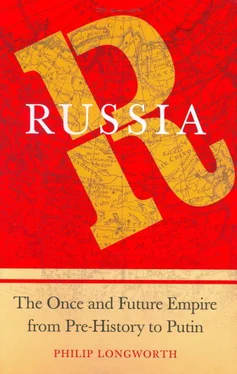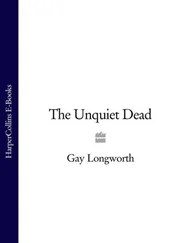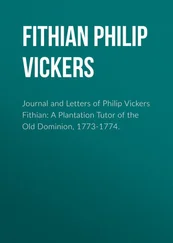The population of the region was sparse, consisting of small communities of tribal hunters — Voguls and Ostiaks — though Tatars were beginning to penetrate the area from the south. Understanding that predators and traders tend to gather wherever wealth is generated, the Tsar authorized the Stroganovs to establish a fort at some appropriate point along the river, to equip it with cannon, and to man it with arquebusiers. In 1563 the concession was extended along both banks of the Kama and up its tributary, the Chusovaia. Furthermore, the regional government of Perm was warned not to interfere with any homesteaders in the region and to leave its defence to the Stroganovs. These grants of imperial property to a private individual, though rare in Russian law, were not unlike the charters granted by the kings of England or France to Western merchant venturers in that age. 15
From this one seed grew a great regional enterprise, the basis of the Stroganov family fortune, and the conquest of Siberia. Despite its immense extent, Siberia was very sparsely populated and the material culture of its natives was mostly stuck in the Stone Age. Only one of its peoples posed any serious opposition to Russian colonization — a group of Tatars descended from a branch of Baty Khan’s White Horde. However, their khan, Kuchum, offered spirited resistance until the Stroganovs’ private army of hired Cossacks finally overwhelmed him.
In 1579 a messenger was to be ushered into Ivan’s presence. He bore a trophy for the Tsar — a splendid fur robe. It had belonged to Kuchum Khan. Stroganov’s man Yermak had fought his way through to the Khan’s camp on the river Irtysh with 500 men, and had routed Kuchum’s army. 16Although Kuchum returned to get his revenge by killing Yermak and many of his band, he was eventually forced to flee, and from then on there was little to impede Russia from extending all the way to the Pacific — except vast distances, difficult terrain, and weather conditions which could be vicious. The immense economic and strategic implications of the Stroganov grant, however, could hardly have been foreseen by Russia’s government of the time. But nor did the kings of England and of France realize that the little overseas colonies they founded in that age would one day be recognized as the beginnings of great empires.
Flushed with his victories in the south, Tsar Ivan had immediately turned his attention westward to Livonia. Russia had long been probing westward, of course, but the scale and force of the 1558 campaign was new — as was its purpose: to secure Russia a base on the Baltic and direct access to the West. This was despite the fact that a Western country had just found a new route to Russia. It was while trying to find a north-east passage to China that an English expedition led by Richard Chancellor had landed on the White Sea coast at the mouth of the Northern Dvina river. As a result, direct diplomatic and commercial relations were established between England and Russia. Trade soon developed sufficiently to merit the establishment of a trading house for the English at Kholmogorii, on the way to Moscow, and in 1584 the port town of Archangel was founded to service the trade in the summer months when the ice receded sufficiently to allow ships to make the perilous voyage round North Cape. The significance of the link had early been noted by the Polish government, which became alarmed by the possibility that Russia might be able to obtain up-to-date military equipment from England and tried unsuccessfully to stop it. The link was also significant in providing the English with first-hand reports of Muscovy, and not least in giving Moscow up-to-date intelligence about England and developments in western Europe 17 — matters in which Ivan took a keen personal interest. All this strengthened his resolve to gain access to a more convenient sea route to the West from a warmer Baltic port.
The Livonian campaign was fought in the area of what are now Estonia and Latvia, and was well timed. The region had long been ruled by the Knights of the Teutonic Order and the Knights of the Sword, displaced crusaders whose raison d’être had long been questioned, and whose hold was now undermined by the popularity of Lutheranism and by military threats from Sweden and Denmark as well as Russia. Nor were the Russians any longer at a technological disadvantage, as once they had been; they attacked in force, deploying large numbers of soldiers and hauling a large siege train with them. They were assisted to some degree by native Letts who hated their German masters and did what they could to sabotage their operations. Stronghold after stronghold submitted without a fight. Narva fell in May, Derpt in July, and then Wesenberg. Wesenberg was soon recaptured, but the Russians held on to Narva and Derpt as well as many other strong-points. As was the case with the newly acquired territories in the south, Muscovite governors were immediately installed, backed by government clerks. 18
But then success became more elusive, and its price higher. The German Knights of Livonia and the former autonomous Hansa cities of the region soon recognized that they could not withstand the might of Russia’s army alone, and so they sought the protection of other powers. Reval submitted to Sweden, Riga and the Duchy of Courland to Poland-Lithuania; another part of Livonia fell to Denmark. Hostilities dragged on from months to years, the area of operations broadened, and the war became more intense.
In 1563, when Ivan’s troops, opening up a new front, stormed the Polish city of Polotsk, it was said that they ordered ‘twenty thousand people, first to have their arms and legs chopped off, and then to be strangled… No words can express the outrages they committed among Matrons, Maidens and Children… [Then the victims] were stripped naked and… led chained into captivity… [This] created an exceeding terror into the whole of this province.’ 19Terror had long been used as a means of scaring an enemy into headlong retreat, but this account is reminiscent of descriptions of the Mongol terror in central Europe three centuries earlier, and it may have repeated conventional literary tropes. Nevertheless, well founded or not, hate literature concerning Russia and the Russians was gaining wide currency in the West, especially in Germany.
Though locked into this war in the west, Ivan also needed to maintain a strong military establishment in the south, to safeguard earlier successes and contain the Crimean khan and his mighty overlord, the Ottoman sultan. The strains of this huge effort in two directions eventually precipitated a crisis for the Russian state. The crisis was associated with the creation by Ivan early in 1565 of a seemingly weird institution. Known as the oprichnina, 20 which suggests something apart or separate, it was a kind of state outside the state, owning extensive properties and run by Ivan’s trusties, who wore black cowls and carried brooms and dogs’-heads at their saddle-bows.
The oprichnina is associated with a reign of terror. This strange and bloody episode in Russia’s history has been attributed to Ivan’s paranoia -to his belief that many of the elite, including ministers, former trusties and prelates of the Church, were plotting against him. On the other hand, proponents of Ivan have adduced evidence of plots, and the Tsar is commonly, and accurately, portrayed as lashing out angrily against those who stood in his way Even so, the psychological and political interpretations are not entirely satisfactory
It is only when account is taken of the financial demands of war and the determined opposition of vested interests to Ivan’s exercise of personal power, not least within the court itself, that the oprichnina and the terror become explicable in rational terms. The cause of strife had little to do with personalities, but a great deal to do with the state’s attempt to extend its fiscal base and secure suffient income for all the servicemen it needed. 21It also had to do with the primitive character of Russian social institutions. Other states could use or mould existing institutions to serve its needs. Russia often had to create them. Even such apparently quintessentially Russian institutions as the liquor-house (kabak), notorious haven of the heroic Russian drunk, and the village commune (mir or obshchina), fabled proof that Russians were natural democrats, were the inventions of Ivan’s state. 22The first was a means of exploiting the state’s monopoly of spirits in the most profitable way; the second was a means of imposing a collective obligation to pay taxes.
Читать дальше





![Stephan Orth - Behind Putin's Curtain - Friendships and Misadventures Inside Russia [aka Couchsurfing in Russia]](/books/415210/stephan-orth-behind-putin-s-curtain-friendships-a-thumb.webp)





